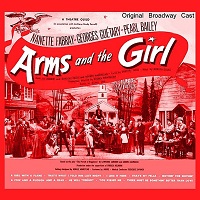 Original Broadway Cast, 1948 (Decca)
Original Broadway Cast, 1948 (Decca)  (3 / 5) The Theatre Guild was riding the success of the still-running Oklahoma! when Armina Marshall Langner suggested that The Pursuit of Happiness, a play she had written with her husband, Lawrence Langner, would make a good musical. Rouben Mamoulian, who had directed the Guild’s earlier successes (including Porgy and Bess, Oklahoma!, and Carousel), was brought in to helm Arms and the Girl. Morton Gould and Dorothy Fields wrote the score, their only Broadway collaboration. Judging from the cast album, the show was distinguished primarily by its three leading performers: Georges Guetary (a French musical theater star), Nanette Fabray, and Pearl Bailey. For Fabray, this was another unsuccessful vehicle that would keep her from achieving major Broadway stardom on a par with Ethel Merman and Mary Martin. Still, her work here is colorful and exciting in “Girl With a Flame” and “That’s My Fella.” She’s great in her duets with Guetary, who does also does well with the charming if corny “A Cow and a Plow and a Frau.” But the big news of the show was Pearl Bailey in a scene-stealing role. She played a slave who changes her name according to where she is geographically — so, as “Connecticut,” she sings the bawdily humorous “There Must Be Something Better than Love” and the lesser “Nothin’ for Nothin’.” Note: The CD edition of this album also includes cast recordings of Up in Central Park; both albums have been meticulously remastered, and they sound as good as any recordings of the period could be expected to. The disc filled an important gap in the catalogue, so we should be grateful to Decca Broadway for its release. — Jeffrey Dunn
(3 / 5) The Theatre Guild was riding the success of the still-running Oklahoma! when Armina Marshall Langner suggested that The Pursuit of Happiness, a play she had written with her husband, Lawrence Langner, would make a good musical. Rouben Mamoulian, who had directed the Guild’s earlier successes (including Porgy and Bess, Oklahoma!, and Carousel), was brought in to helm Arms and the Girl. Morton Gould and Dorothy Fields wrote the score, their only Broadway collaboration. Judging from the cast album, the show was distinguished primarily by its three leading performers: Georges Guetary (a French musical theater star), Nanette Fabray, and Pearl Bailey. For Fabray, this was another unsuccessful vehicle that would keep her from achieving major Broadway stardom on a par with Ethel Merman and Mary Martin. Still, her work here is colorful and exciting in “Girl With a Flame” and “That’s My Fella.” She’s great in her duets with Guetary, who does also does well with the charming if corny “A Cow and a Plow and a Frau.” But the big news of the show was Pearl Bailey in a scene-stealing role. She played a slave who changes her name according to where she is geographically — so, as “Connecticut,” she sings the bawdily humorous “There Must Be Something Better than Love” and the lesser “Nothin’ for Nothin’.” Note: The CD edition of this album also includes cast recordings of Up in Central Park; both albums have been meticulously remastered, and they sound as good as any recordings of the period could be expected to. The disc filled an important gap in the catalogue, so we should be grateful to Decca Broadway for its release. — Jeffrey Dunn
Category Archives: A-C
archy and mehitabel
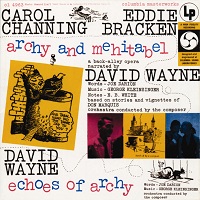 Concept Album, 1954 (Columbia/Masterworks Broadway)
Concept Album, 1954 (Columbia/Masterworks Broadway)  (3 / 5) Based on the 1920s newspaper columns of Don Marquis, archy and mehitabel stars a cockroach. Ostensibly, the columns were the work of said cockroach, named archy, who wrote them for Marquis in exchange for some apple peels left in the trash. The roach handled the mechanics of writing by hurling himself head first at the typewriter keys, and everything was in lower case because he couldn’t reach the shift key. This recording is sort of a grab-bag suite taken from different archy pieces, with scenes and narration by Joe Darion (lyricist of Man of La Mancha) underscored with music by George Kleinsinger (composer of Tubby the Tuba). The underscoring provides a real New York atmosphere, and it occasionally explodes into whimsical songs and entertaining melodic fragments. The text is made of of archy’s thoughts (e.g., “people may think they amount to a great deal, but to a mosquito, they’re just a meal”) and stories of the odd characters he runs into. Most of his stories are about mehitabel (Carol Channing), the alley cat whom he loves unrequitedly. She takes up with a disreputable tomcat that leaves her with a litter of kittens saved by archy (Eddie Bracken) from drowning in a rainstorm. She “studies acting” with a disreputable old theater cat, then reluctantly gives in and takes a job as a house cat — but, unable to stand domesticity, she returns to the alley. In 1957, the piece was adapted for the stage as Shinbone Alley, with a full Kleinsinger-Darion score and a book by Mel Brooks; Eddie Bracken repeated his role, and Eartha Kitt played mehitabel. Three years after the Broadway failure, it turned up in a two-hour TV adaptation with Bracken and Tammy Grimes. Finally, in 1970, it became an animated cartoon with Bracken and Channing. Pirated recordings exist of the TV version, and there is also a complete, live pirate of the Broadway show, but the concept album is the only commercial recording available. — David Wolf
(3 / 5) Based on the 1920s newspaper columns of Don Marquis, archy and mehitabel stars a cockroach. Ostensibly, the columns were the work of said cockroach, named archy, who wrote them for Marquis in exchange for some apple peels left in the trash. The roach handled the mechanics of writing by hurling himself head first at the typewriter keys, and everything was in lower case because he couldn’t reach the shift key. This recording is sort of a grab-bag suite taken from different archy pieces, with scenes and narration by Joe Darion (lyricist of Man of La Mancha) underscored with music by George Kleinsinger (composer of Tubby the Tuba). The underscoring provides a real New York atmosphere, and it occasionally explodes into whimsical songs and entertaining melodic fragments. The text is made of of archy’s thoughts (e.g., “people may think they amount to a great deal, but to a mosquito, they’re just a meal”) and stories of the odd characters he runs into. Most of his stories are about mehitabel (Carol Channing), the alley cat whom he loves unrequitedly. She takes up with a disreputable tomcat that leaves her with a litter of kittens saved by archy (Eddie Bracken) from drowning in a rainstorm. She “studies acting” with a disreputable old theater cat, then reluctantly gives in and takes a job as a house cat — but, unable to stand domesticity, she returns to the alley. In 1957, the piece was adapted for the stage as Shinbone Alley, with a full Kleinsinger-Darion score and a book by Mel Brooks; Eddie Bracken repeated his role, and Eartha Kitt played mehitabel. Three years after the Broadway failure, it turned up in a two-hour TV adaptation with Bracken and Tammy Grimes. Finally, in 1970, it became an animated cartoon with Bracken and Channing. Pirated recordings exist of the TV version, and there is also a complete, live pirate of the Broadway show, but the concept album is the only commercial recording available. — David Wolf
Almost Famous
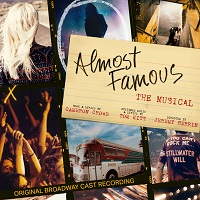 Original Broadway Cast, 2022 (Masterworks Broadway)
Original Broadway Cast, 2022 (Masterworks Broadway)  (2 / 5) Meet the semi-jukebox musical: Almost Famous, based on the film about a 1970s rock band and the teen journalist William (Casey Likes) who embeds himself on tour, blends original songs by Tom Kitt and the film’s screenwriter, Cameron Crowe, with period hits and an occasional song written for the film. The problem is that the jukebox tunes — such as Elton John’s “Tiny Dancer,” Cat Stevens’ “The Wind,” and Joni Mitchell’s “River” — are far superior to the new material, especially as presented through Kitt’s characteristically lovely arrangements. Anika Larsen nails her big number in the role of William’s mother, lamenting in “Elaine’s Lecture” that “rock stars have kidnapped my son.” That’s really the show’s only effective character piece, since most of the new songs for Likes, Chris Wood as band frontman Russell, and Solea Pfeiffer as the mysterious, captivating groupie Penny Lane lack distinction. Pfeiffer in particular sounds stellar, but her songs aren’t worthy of her vocal maturity. The lyrics, by Kitt and Crowe, seldom sculpt the characters with any specificity. And even if songs like “Everybody’s Coming Together” aren’t from the jukebox, in a sense they might as well be: “Come join the revolution tonight / Be part of the solution tonight,” the ensemble sings generically. In a Broadway landscape overtaken by creators trying to make jukebox musicals and film adaptations theatrically viable, Almost Famous isn’t part of the solution on either count. — Dan Rubins
(2 / 5) Meet the semi-jukebox musical: Almost Famous, based on the film about a 1970s rock band and the teen journalist William (Casey Likes) who embeds himself on tour, blends original songs by Tom Kitt and the film’s screenwriter, Cameron Crowe, with period hits and an occasional song written for the film. The problem is that the jukebox tunes — such as Elton John’s “Tiny Dancer,” Cat Stevens’ “The Wind,” and Joni Mitchell’s “River” — are far superior to the new material, especially as presented through Kitt’s characteristically lovely arrangements. Anika Larsen nails her big number in the role of William’s mother, lamenting in “Elaine’s Lecture” that “rock stars have kidnapped my son.” That’s really the show’s only effective character piece, since most of the new songs for Likes, Chris Wood as band frontman Russell, and Solea Pfeiffer as the mysterious, captivating groupie Penny Lane lack distinction. Pfeiffer in particular sounds stellar, but her songs aren’t worthy of her vocal maturity. The lyrics, by Kitt and Crowe, seldom sculpt the characters with any specificity. And even if songs like “Everybody’s Coming Together” aren’t from the jukebox, in a sense they might as well be: “Come join the revolution tonight / Be part of the solution tonight,” the ensemble sings generically. In a Broadway landscape overtaken by creators trying to make jukebox musicals and film adaptations theatrically viable, Almost Famous isn’t part of the solution on either count. — Dan RubinsBring It On
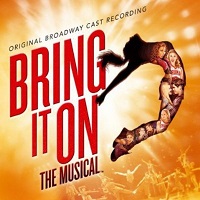 Original Broadway Cast, 2012 (Backlot Music)
Original Broadway Cast, 2012 (Backlot Music)  (3 / 5) If you love Lin-Manuel Miranda’s score for In the Heights, you’ll find lots of pleasures in Bring It On. This musical adaptation of a 2000 film about cheerleaders is copiously sprinkled with Miranda emeralds. About two thirds of the songs are by Tom Kitt and Amanda Green, writing in a lively, poppish vein that sounds familiar within the high school musical genre (though buoyantly orchestrated by Kitt and Alex Lacamoire), but the remaining numbers by Miranda ignite on a different level. Though too many of his songs here may build just like In The Heights‘ “96,000” — this show doesn’t celebrate his full range as a composer — they’re fun individually, and “It’s All Happening,” the Act II opener, is as explosive and ebullient as anything Miranda has written. The centerpiece of that song is a cheeky rap for Twig (Nick Womack), in a style reminiscent of In the Heights‘ Sonny, arguing for the virtues of boys joining the cheerleading team. But even though there are deeper themes like friendship across differences and finding your squad, most of the songs are really just about cheerleading, a topic that can only animate so many distinct musical numbers. If the well of inspiration eventually runs dry, that’s no fault of the electric cast, led by Taylor Louderman and Adrienne Warren as reluctant teammates-turned-besties. There is also a delightful early performance from Ariana DeBose. — Dan Rubins
(3 / 5) If you love Lin-Manuel Miranda’s score for In the Heights, you’ll find lots of pleasures in Bring It On. This musical adaptation of a 2000 film about cheerleaders is copiously sprinkled with Miranda emeralds. About two thirds of the songs are by Tom Kitt and Amanda Green, writing in a lively, poppish vein that sounds familiar within the high school musical genre (though buoyantly orchestrated by Kitt and Alex Lacamoire), but the remaining numbers by Miranda ignite on a different level. Though too many of his songs here may build just like In The Heights‘ “96,000” — this show doesn’t celebrate his full range as a composer — they’re fun individually, and “It’s All Happening,” the Act II opener, is as explosive and ebullient as anything Miranda has written. The centerpiece of that song is a cheeky rap for Twig (Nick Womack), in a style reminiscent of In the Heights‘ Sonny, arguing for the virtues of boys joining the cheerleading team. But even though there are deeper themes like friendship across differences and finding your squad, most of the songs are really just about cheerleading, a topic that can only animate so many distinct musical numbers. If the well of inspiration eventually runs dry, that’s no fault of the electric cast, led by Taylor Louderman and Adrienne Warren as reluctant teammates-turned-besties. There is also a delightful early performance from Ariana DeBose. — Dan RubinsColette / Colette Collage
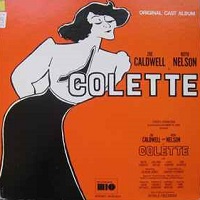 Original Off-Broadway Cast, 1970 (MIO International/no CD)
Original Off-Broadway Cast, 1970 (MIO International/no CD)  (3 / 5) This version of Colette is a charming play with music. The play itself was written by Elinor Jones, then married to lyricist Tom Jones. Colette is portrayed by Zoe Caldwell, who attacks the role boldly, and Ruth Nelson gives a vivid performance as Colette’s mother. The other actors — Keith Charles, Holland Taylor, Louis Turenne, and Tom Aldredge — are fine but, on the record anyway, they’re just props. Tom Jones and composer Harvey Schmidt contributed three songs that begin the recording; all of them are odd and delightful, and one of them, “Earthly Paradise,” is as lovely as anything the team ever wrote. Schmidt’s underscoring of a long montage sequence is stunning — it plays almost like a short comic ballet — and his gorgeous, dramatic music fills the recording. The composer was onstage throughout the play, in period costume, accompanying the action on piano. Apparently, the music was improvised every night during the run; when Schmidt was out ill, performances had to be canceled, since no one else could play the music because he had never written it down! — David Wolf
(3 / 5) This version of Colette is a charming play with music. The play itself was written by Elinor Jones, then married to lyricist Tom Jones. Colette is portrayed by Zoe Caldwell, who attacks the role boldly, and Ruth Nelson gives a vivid performance as Colette’s mother. The other actors — Keith Charles, Holland Taylor, Louis Turenne, and Tom Aldredge — are fine but, on the record anyway, they’re just props. Tom Jones and composer Harvey Schmidt contributed three songs that begin the recording; all of them are odd and delightful, and one of them, “Earthly Paradise,” is as lovely as anything the team ever wrote. Schmidt’s underscoring of a long montage sequence is stunning — it plays almost like a short comic ballet — and his gorgeous, dramatic music fills the recording. The composer was onstage throughout the play, in period costume, accompanying the action on piano. Apparently, the music was improvised every night during the run; when Schmidt was out ill, performances had to be canceled, since no one else could play the music because he had never written it down! — David Wolf
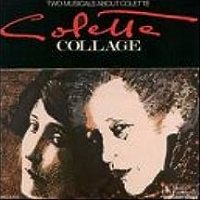 Off-Broadway Cast Members, 1994 (Varèse Sarabande)
Off-Broadway Cast Members, 1994 (Varèse Sarabande)  (2 / 5) A production of the full-length musical Colette that starred Diana Rigg was intended for Broadway but closed on the road in 1982. Librettist and composer Jones and Schmidt revised the show in ’83 and again in ’91; along the way, it was retitled Colette Collage. Act I of the final version concentrates on the French novelist’s first marriage to Willy, a writer who thinks nothing of publishing work by others — including his wife — under his own name. Her books, which everyone thinks are his books, become hugely successful, and she finally leaves him. Act II covers Coletee’s later years of fame and her relationship with a younger man, Maurice. The music is lovely, amusing, and evocative, but nothing here is as beautiful as Schmidt’s best work. Colette is played by Judy Blazer in the first act, Judy Kaye in the second; both sing gloriously and are matched by George Lee Andrews as Willy, Rita Gardner as Colette’s mother, and Jason Graae as Maurice. The only piece retained from the Elinor Jones play is Schmidt’s thrilling music-hall-tour montage, cut down and fitted with lyrics by Jones. Unfortunately, it’s less effective here than as presented on the recording reviewed above. — D.W.
(2 / 5) A production of the full-length musical Colette that starred Diana Rigg was intended for Broadway but closed on the road in 1982. Librettist and composer Jones and Schmidt revised the show in ’83 and again in ’91; along the way, it was retitled Colette Collage. Act I of the final version concentrates on the French novelist’s first marriage to Willy, a writer who thinks nothing of publishing work by others — including his wife — under his own name. Her books, which everyone thinks are his books, become hugely successful, and she finally leaves him. Act II covers Coletee’s later years of fame and her relationship with a younger man, Maurice. The music is lovely, amusing, and evocative, but nothing here is as beautiful as Schmidt’s best work. Colette is played by Judy Blazer in the first act, Judy Kaye in the second; both sing gloriously and are matched by George Lee Andrews as Willy, Rita Gardner as Colette’s mother, and Jason Graae as Maurice. The only piece retained from the Elinor Jones play is Schmidt’s thrilling music-hall-tour montage, cut down and fitted with lyrics by Jones. Unfortunately, it’s less effective here than as presented on the recording reviewed above. — D.W.
Anya / The Anastasia Affaire / Anastasia: The Musical
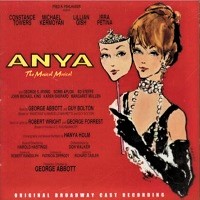 Original Broadway Cast, 1965 (United Artists/Kritzerland)
Original Broadway Cast, 1965 (United Artists/Kritzerland)  (3 / 5) What Robert Wright and George Forrest had previously done successfully with Grieg and Borodin, they did with Rachmaninoff in creating a musical based on the play Anastasia, the story of the woman who claimed to be the only surviving member of the Romanov family assassination. Rachmaninoff’s music was well suited to a piece with action that takes place shortly after the Russian Revolution, and while fans of that music in its original form might find this adaptation hard to take, it’s a lush, beautifully sung, latter-day operetta. Although the show was plodding onstage, the recording is very entertaining. Constance Towers and Michael Kermoyan are excellent in all of their songs, particularly in “My Kind of Love” (the melody had previously served as the basis for the popular hit “Full Moon and Empty Arms”) and the dramatic “Six Palaces” (in which Anya is drilled on the “facts” of her life). Irra Petina, the grande dame of the “floperetta” genre, is a joy in the comic “Leben Sie Wohl” and “On That Day,” and she also leads the haunting “Homeward.” For camp value, there is Lillian Gish as the Grand Duchess, “reciting” lyrics to a vocalise sung by Towers as Anya. Billed as “The Musical Musical,” the show was one of the late-career flops of director George Abbott, who also collaborated on the book with Guy Bolton. (This was Bolton’s final Broadway credit.) The cast album notes detail which Rachmaninoff pieces have been adapted for each song. There are also two songs listed on the back of the original LP jacket that are not actually on the album; they were cut from the show during previews and, from all reports, weren’t recorded. — Jeffrey Dunn
(3 / 5) What Robert Wright and George Forrest had previously done successfully with Grieg and Borodin, they did with Rachmaninoff in creating a musical based on the play Anastasia, the story of the woman who claimed to be the only surviving member of the Romanov family assassination. Rachmaninoff’s music was well suited to a piece with action that takes place shortly after the Russian Revolution, and while fans of that music in its original form might find this adaptation hard to take, it’s a lush, beautifully sung, latter-day operetta. Although the show was plodding onstage, the recording is very entertaining. Constance Towers and Michael Kermoyan are excellent in all of their songs, particularly in “My Kind of Love” (the melody had previously served as the basis for the popular hit “Full Moon and Empty Arms”) and the dramatic “Six Palaces” (in which Anya is drilled on the “facts” of her life). Irra Petina, the grande dame of the “floperetta” genre, is a joy in the comic “Leben Sie Wohl” and “On That Day,” and she also leads the haunting “Homeward.” For camp value, there is Lillian Gish as the Grand Duchess, “reciting” lyrics to a vocalise sung by Towers as Anya. Billed as “The Musical Musical,” the show was one of the late-career flops of director George Abbott, who also collaborated on the book with Guy Bolton. (This was Bolton’s final Broadway credit.) The cast album notes detail which Rachmaninoff pieces have been adapted for each song. There are also two songs listed on the back of the original LP jacket that are not actually on the album; they were cut from the show during previews and, from all reports, weren’t recorded. — Jeffrey Dunn
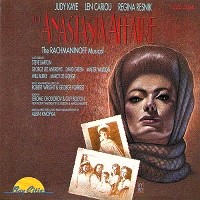 Studio Casts, 1992-1998 (Bay Cities/Original Cast Records)
Studio Casts, 1992-1998 (Bay Cities/Original Cast Records)  (2 / 5) These recordings are not just Anya with two pianos. When it became clear that the 1965 production was going to close on Broadway after 16 performances, director and co-librettist George Abbott graciously ceded all of the rights to Wright and Forrest. The musical was revised and produced regionally as A Song for Anastasia and The Anastasia Game. A recording titled The Anastasia Affaire, based on a production at the Merrimack Theatre in Massachusetts, was released in 1992 and quickly went out of print. In 1998, with the title now changed to Anastasia: The Musical, the CD was reissued with bonus tracks of six “premiere recordings” of Wright and Forrest songs from other shows. The majority of the Rachmaninoff melodies used for Anya were used again in the revisions, but most of them were given new lyrics and made to serve new dramatic functions. While the Broadway score leaned heavily toward “nouveau operetta,” the final version is definitely a chamber musical with two-piano accompaniment, well handled by Albin Konopka and Seth Rudetsky. The principal singers are Judy Kaye, Regina Resnik, Len Cariou, Steve Barton, George Lee Andrews, Walter Willison, and David Green, all in top form. The story of Anastasia is more clearly discerned from the songs in the new version; still, the original Broadway cast album of Anya, with its grand orchestrations and operatic singing, is a more enjoyable listen. — J.D.
(2 / 5) These recordings are not just Anya with two pianos. When it became clear that the 1965 production was going to close on Broadway after 16 performances, director and co-librettist George Abbott graciously ceded all of the rights to Wright and Forrest. The musical was revised and produced regionally as A Song for Anastasia and The Anastasia Game. A recording titled The Anastasia Affaire, based on a production at the Merrimack Theatre in Massachusetts, was released in 1992 and quickly went out of print. In 1998, with the title now changed to Anastasia: The Musical, the CD was reissued with bonus tracks of six “premiere recordings” of Wright and Forrest songs from other shows. The majority of the Rachmaninoff melodies used for Anya were used again in the revisions, but most of them were given new lyrics and made to serve new dramatic functions. While the Broadway score leaned heavily toward “nouveau operetta,” the final version is definitely a chamber musical with two-piano accompaniment, well handled by Albin Konopka and Seth Rudetsky. The principal singers are Judy Kaye, Regina Resnik, Len Cariou, Steve Barton, George Lee Andrews, Walter Willison, and David Green, all in top form. The story of Anastasia is more clearly discerned from the songs in the new version; still, the original Broadway cast album of Anya, with its grand orchestrations and operatic singing, is a more enjoyable listen. — J.D.
Ambassador
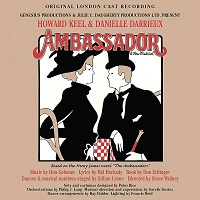 Original London Cast, 1971 (RCA/Stage Door)
Original London Cast, 1971 (RCA/Stage Door)  (2 / 5) The original London cast album of this Henry James adaptation is also the de facto original Broadway cast album, since the West End’s two leads, Howard Keel and Danielle Darrieux, reprised their roles in New York not long after the show’s quick demise in London, and they carry the bulk of the musical program. James’ favorite theme, the clash of American ingenuousness and European worldliness, gets a thorough working-over in this story of a New England milquetoast named Lambert (Keel) dispatched to Paris by a dominating widow to retrieve her philandering son. Instead, Lambert falls under the spell of Paree and, more specifically, of a fascinating countess (Darrieux). The globe-trotting narrative was simplified for the stage, which the score reflects. Don Gohman’s melodies are attractive, if a bit derivative, and Hal Hackady’s lyrics strive diligently to pull James’ ideas together into a cohesive package. Some terrible comedy songs — e.g. “What Can You Do With a Nude?” — were mercifully left behind in London but made it onto the recording. Andrea Marcovicci, who introduced the affecting “Love Finds the Lonely” in her Broadway debut, isn’t heard here; her London counterpart, Isobel Stuart, is capable, but Marcovicci must have been heartbreaking. Keel is hardworking but miscast as a milquetoast. Darrieux has very little voice, so she tries to compensate with charm, and succeeds only halfway. The most vivid performance here comes from Margaret Courtenay as the horrifying harpy who sets the plot in motion. She’s no singer, but it’s a great character, and Courtenay has every character nuance under her tight corset. Some fine theater songs are scattered about — “Tell Her,” “The Right Time/The Right Place” — yet they fail to convince us that a Henry James musical is a good idea. While one admires the creative team’s ambition to write a soufflé that’s also serious, the results sound more like Gigi with a hangover. — Marc Miller
(2 / 5) The original London cast album of this Henry James adaptation is also the de facto original Broadway cast album, since the West End’s two leads, Howard Keel and Danielle Darrieux, reprised their roles in New York not long after the show’s quick demise in London, and they carry the bulk of the musical program. James’ favorite theme, the clash of American ingenuousness and European worldliness, gets a thorough working-over in this story of a New England milquetoast named Lambert (Keel) dispatched to Paris by a dominating widow to retrieve her philandering son. Instead, Lambert falls under the spell of Paree and, more specifically, of a fascinating countess (Darrieux). The globe-trotting narrative was simplified for the stage, which the score reflects. Don Gohman’s melodies are attractive, if a bit derivative, and Hal Hackady’s lyrics strive diligently to pull James’ ideas together into a cohesive package. Some terrible comedy songs — e.g. “What Can You Do With a Nude?” — were mercifully left behind in London but made it onto the recording. Andrea Marcovicci, who introduced the affecting “Love Finds the Lonely” in her Broadway debut, isn’t heard here; her London counterpart, Isobel Stuart, is capable, but Marcovicci must have been heartbreaking. Keel is hardworking but miscast as a milquetoast. Darrieux has very little voice, so she tries to compensate with charm, and succeeds only halfway. The most vivid performance here comes from Margaret Courtenay as the horrifying harpy who sets the plot in motion. She’s no singer, but it’s a great character, and Courtenay has every character nuance under her tight corset. Some fine theater songs are scattered about — “Tell Her,” “The Right Time/The Right Place” — yet they fail to convince us that a Henry James musical is a good idea. While one admires the creative team’s ambition to write a soufflé that’s also serious, the results sound more like Gigi with a hangover. — Marc Miller
Aladdin (Cole Porter)
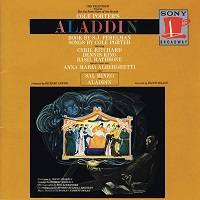 Original Television Cast, 1958 (Columbia/Sony)
Original Television Cast, 1958 (Columbia/Sony)  (3 / 5) The later-in-life work of most great musical theater writers isn’t up to the quality of their more youthful forays; but with the exception of his score for the film Les Girls, Cole Porter ended his career somewhere close to his high standard. Aladdin was an original television musical, a popular entertainment form at the time. Major teams such as Rodgers & Hammerstein, Bock & Harnick, and other great composers and lyricists contributed to the genre, with mixed results. Porter’s Aladdin, with a libretto by S.J. Perelman, was among the best of the bunch. produced at the end of a wonderful era wherein most entertainment suitable for children was equally enjoyable for adults. Apart from its tuneful and witty score, it had a dream cast: stage veterans Dennis King and Cyril Ritchard, film favorites Una Merkel and Basil Rathbone, and newcomers Anna Maria Alberghetti and Sal Mineo. All of them brought their unique talents to the project. A highlight of the score and the highly enjoyable cast album is “Come to the Supermarket (in Old Peking.” — Ken Bloom
(3 / 5) The later-in-life work of most great musical theater writers isn’t up to the quality of their more youthful forays; but with the exception of his score for the film Les Girls, Cole Porter ended his career somewhere close to his high standard. Aladdin was an original television musical, a popular entertainment form at the time. Major teams such as Rodgers & Hammerstein, Bock & Harnick, and other great composers and lyricists contributed to the genre, with mixed results. Porter’s Aladdin, with a libretto by S.J. Perelman, was among the best of the bunch. produced at the end of a wonderful era wherein most entertainment suitable for children was equally enjoyable for adults. Apart from its tuneful and witty score, it had a dream cast: stage veterans Dennis King and Cyril Ritchard, film favorites Una Merkel and Basil Rathbone, and newcomers Anna Maria Alberghetti and Sal Mineo. All of them brought their unique talents to the project. A highlight of the score and the highly enjoyable cast album is “Come to the Supermarket (in Old Peking.” — Ken Bloom
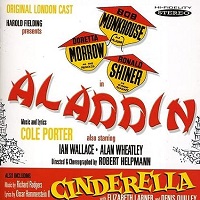 Original London Cast, 1960 (Columbia/DRG)
Original London Cast, 1960 (Columbia/DRG)  (1 / 5) Cole Porter’s Aladdin was never adapted for presentation on Broadway, but the London stage production — tarted up as a Christmas pantomime — yielded this unfortunate recording. It includes a few songs interpolated from other Porter shows, none of which fit the spirit and tone of the original; they’re too jazzy and out-of period. Doretta Morrow displays a wonderful voice on the recording, but it sounds, shall we say, too mature for the character of the princess. (She does offer a first-class rendition of “I Am Loved,” interpolated from Out of This World.) Cyril Ritchard is sorely missed on this recording, as is the maturity and authority of Dennis King. And whereas the original TV production had great orchestrations by Robert Russell Bennett, this one features more “mod” arrangements that haven’t withstood the test of time. — K.B.
(1 / 5) Cole Porter’s Aladdin was never adapted for presentation on Broadway, but the London stage production — tarted up as a Christmas pantomime — yielded this unfortunate recording. It includes a few songs interpolated from other Porter shows, none of which fit the spirit and tone of the original; they’re too jazzy and out-of period. Doretta Morrow displays a wonderful voice on the recording, but it sounds, shall we say, too mature for the character of the princess. (She does offer a first-class rendition of “I Am Loved,” interpolated from Out of This World.) Cyril Ritchard is sorely missed on this recording, as is the maturity and authority of Dennis King. And whereas the original TV production had great orchestrations by Robert Russell Bennett, this one features more “mod” arrangements that haven’t withstood the test of time. — K.B.
Ain’t Supposed to Die a Natural Death
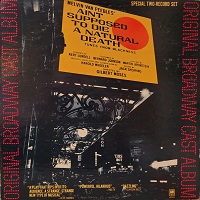 Original Broadway Cast, 1971 (A&R, 2LPs; no CD)
Original Broadway Cast, 1971 (A&R, 2LPs; no CD)  (2 / 5) Onstage, this piece with book, music, and lyrics by Melvin van Peebles was intensely theatrical; I was actually frightened when cast member Minnie Gentry looked straight at me and vowed to “Put a Curse on You.” On record, it’s a less powerful experience — an interesting assemblage of jazz-based songs, dramatic monologues, and narratives delivered by a cast including Bill Duke, Albert Hall, Garrett Morris, and Beatrice Winde. (Ossie Davis and Phylicia Rashad joined the company in 1972, after this recording was made.) Much of the show is written in what might be called a “street poetry” style, if that phrase is not too pretentious. Ain’t Supposed to Die a Natural Death is skillfully constructed, with the songs and the very attractive underscoring enhancing the monologues as they move into, out of, and around them. I can’t say this is a cast album I listen to every day, but if you can find a copy, it certainly won’t bore you. — David Wolf
(2 / 5) Onstage, this piece with book, music, and lyrics by Melvin van Peebles was intensely theatrical; I was actually frightened when cast member Minnie Gentry looked straight at me and vowed to “Put a Curse on You.” On record, it’s a less powerful experience — an interesting assemblage of jazz-based songs, dramatic monologues, and narratives delivered by a cast including Bill Duke, Albert Hall, Garrett Morris, and Beatrice Winde. (Ossie Davis and Phylicia Rashad joined the company in 1972, after this recording was made.) Much of the show is written in what might be called a “street poetry” style, if that phrase is not too pretentious. Ain’t Supposed to Die a Natural Death is skillfully constructed, with the songs and the very attractive underscoring enhancing the monologues as they move into, out of, and around them. I can’t say this is a cast album I listen to every day, but if you can find a copy, it certainly won’t bore you. — David Wolf
After the Fair
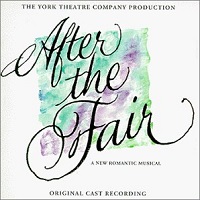 Original Off-Broadway Cast, 1999 (Varèse Sarabande)
Original Off-Broadway Cast, 1999 (Varèse Sarabande)  (2 / 5) It’s the very model of a modern chamber musical: a four-character, four-musician adaptation of a Thomas Hardy short story, here brought to life by Matthew Ward (music) and Stephen Cole (book and lyrics), and lovingly recorded by producer Bruce Kimmel. The slight plot — about a bored, unhappy, provincial couple (Michele Pawk and David Staller) and the wife’s Cyranoesque adventures in helping her maid (Jennifer Piech) conduct a romance with a London barrister (James Ludwig) — comes through clearly and affectingly. Cole’s lyrical craftmanship is striking (“With each passing missive, you grew more passive”) , and Ward’s music, aside from some dreary recitative, isn’t afraid of tunefulness or smart melodic development when the occasion demands. Diligent as the authors are, though, the score’s a bit studied; it sounds something like a Sondheim disciple’s thesis for a graduate degree in musical theater. And the unvarying parade of duets, quartets, and genteel accompaniment adds up to a rather limited musical palette. (Maybe the score worked better in the context of the show onstage.) The cast is variable: Pawk is excellent, Ludwig is sturdy, but you could drive a lorry through the hammy Staller’s vibrato, and Piech’s cartoon-Brit accent simply won’t do. Who was her dialect coach, Dick Van Dyke? — Marc Miller
(2 / 5) It’s the very model of a modern chamber musical: a four-character, four-musician adaptation of a Thomas Hardy short story, here brought to life by Matthew Ward (music) and Stephen Cole (book and lyrics), and lovingly recorded by producer Bruce Kimmel. The slight plot — about a bored, unhappy, provincial couple (Michele Pawk and David Staller) and the wife’s Cyranoesque adventures in helping her maid (Jennifer Piech) conduct a romance with a London barrister (James Ludwig) — comes through clearly and affectingly. Cole’s lyrical craftmanship is striking (“With each passing missive, you grew more passive”) , and Ward’s music, aside from some dreary recitative, isn’t afraid of tunefulness or smart melodic development when the occasion demands. Diligent as the authors are, though, the score’s a bit studied; it sounds something like a Sondheim disciple’s thesis for a graduate degree in musical theater. And the unvarying parade of duets, quartets, and genteel accompaniment adds up to a rather limited musical palette. (Maybe the score worked better in the context of the show onstage.) The cast is variable: Pawk is excellent, Ludwig is sturdy, but you could drive a lorry through the hammy Staller’s vibrato, and Piech’s cartoon-Brit accent simply won’t do. Who was her dialect coach, Dick Van Dyke? — Marc Miller
As You Like It
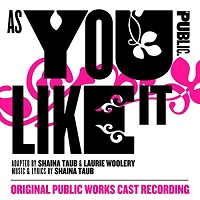 Original Public Works Cast, 2022 (Concord Theatrical Recordings)
Original Public Works Cast, 2022 (Concord Theatrical Recordings)  (3 / 5) The second of composer-lyricist Shaina Taub’s Shakespeare adaptations for the Public Theater’s Public Works program, following Twelfth Night, this As You Like It is a joyful update of Shakespeare’s comedy. In songs like “You Phoebe Me” and “Gettin’ Married Tomorrow,” Taub playfully riffs on Shakespeare’s text in her lyrics. These songs sound closer to those that may be heard on Taub’s solo singer-songwriter albums than to her work on Twelfth Night, so Rosalind sings with a confessional, conversational cynicism in Rebecca Naomi Jones’s thoughtful, strongly-sung performance. Ato Blankson-Wood, who played Orsino in Twelfth Night, sounds wonderful again here. Taub herself is the best interpreter of Taub, and her opening delivery of “All The World’s A Stage” as the moody Jacques (reimagined here as a climate activist) is the album’s highlight. If you’re somehow immune to her charming navigation of her bluesy pop melodies, the chorus of children joining in her song will win you over. These young singers are part of Public Works’ engagement in each of these productions of nearly 100 performers, most of them amateurs, through partnering community organizations. The numerous ensemble moments heard here — including the rousing “In Arden,” led by Darius de Haas, and the gospel-inspired anthem “Still I Will Love” — capture the sense of massive community singing better than the Twelfth Night cast album does. But there’s a little bit of you-had-to-be-there energy to the recording; it’s the memory of the Public’s multi-generational staging that lends these tracks their greatest emotional potency. — Dan Rubins
(3 / 5) The second of composer-lyricist Shaina Taub’s Shakespeare adaptations for the Public Theater’s Public Works program, following Twelfth Night, this As You Like It is a joyful update of Shakespeare’s comedy. In songs like “You Phoebe Me” and “Gettin’ Married Tomorrow,” Taub playfully riffs on Shakespeare’s text in her lyrics. These songs sound closer to those that may be heard on Taub’s solo singer-songwriter albums than to her work on Twelfth Night, so Rosalind sings with a confessional, conversational cynicism in Rebecca Naomi Jones’s thoughtful, strongly-sung performance. Ato Blankson-Wood, who played Orsino in Twelfth Night, sounds wonderful again here. Taub herself is the best interpreter of Taub, and her opening delivery of “All The World’s A Stage” as the moody Jacques (reimagined here as a climate activist) is the album’s highlight. If you’re somehow immune to her charming navigation of her bluesy pop melodies, the chorus of children joining in her song will win you over. These young singers are part of Public Works’ engagement in each of these productions of nearly 100 performers, most of them amateurs, through partnering community organizations. The numerous ensemble moments heard here — including the rousing “In Arden,” led by Darius de Haas, and the gospel-inspired anthem “Still I Will Love” — capture the sense of massive community singing better than the Twelfth Night cast album does. But there’s a little bit of you-had-to-be-there energy to the recording; it’s the memory of the Public’s multi-generational staging that lends these tracks their greatest emotional potency. — Dan Rubins
Chaplin
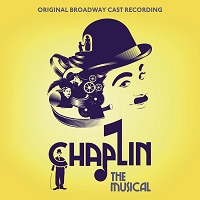 Original Broadway Cast, 2012 (Masterworks Broadway)
Original Broadway Cast, 2012 (Masterworks Broadway)  (2 / 5) In “Just Another Day in Hollywood,” the ensemble of Chaplin sings of “Stars on the rise / Stars on the fall / Stars you forget / Stars you recall.” For all its potential in dramatizing The Little Tramp’s rise and fall in stage musical form, Chaplin turns out to be largely forgettable. Composer-lyricist Christopher Curtis has some neat ideas: for example, an early diegetic number, “Whatcha Gonna Do?”, sung by Charlie Chaplin’s music hall performer mother (Christianne Noll), gradually evolves into a threatening anthem for the McCarthyist columnist Hedda Hopper (Jenn Colella) who tries to bring down Chaplin (Rob McClure) by branding him as a Communist. But Curtis’s songs do little either to develop character or counteract the show’s breakneck race through Chaplin’s life, and most of the first act is a movie-making montage with pastiche songs that don’t evoke the era of the action precisely enough. Often, the score tries to rev up emotional intensity that the storytelling hasn’t earned; one musical sequence, “The Exile,” is almost hilariously melodramatic, as Larry Hochman’s orchestrations follow Curtis’s music in somehow being simultaneously undercooked and overwrought. Elsewhere, thankfully, as in Charlie’s ballad “The Life That You Wished For,” the orchestrations calm down enough to be genuinely stirring. Colella’s belting is impressive, as are Erin Mackey’s very lovely, shimmery singing and Michael McCormick’s avuncular take on Mack Sennett — yes, the same guy from Mack and Mabel! Though McClure in the title role doesn’t have great material to work with, he’s particularly enlivening in the driving “Tramp Shuffle — Pt. 2,” and quite moving in portraying an elderly Chaplin returning to the Oscars at the start of the finale. — Dan Rubins
(2 / 5) In “Just Another Day in Hollywood,” the ensemble of Chaplin sings of “Stars on the rise / Stars on the fall / Stars you forget / Stars you recall.” For all its potential in dramatizing The Little Tramp’s rise and fall in stage musical form, Chaplin turns out to be largely forgettable. Composer-lyricist Christopher Curtis has some neat ideas: for example, an early diegetic number, “Whatcha Gonna Do?”, sung by Charlie Chaplin’s music hall performer mother (Christianne Noll), gradually evolves into a threatening anthem for the McCarthyist columnist Hedda Hopper (Jenn Colella) who tries to bring down Chaplin (Rob McClure) by branding him as a Communist. But Curtis’s songs do little either to develop character or counteract the show’s breakneck race through Chaplin’s life, and most of the first act is a movie-making montage with pastiche songs that don’t evoke the era of the action precisely enough. Often, the score tries to rev up emotional intensity that the storytelling hasn’t earned; one musical sequence, “The Exile,” is almost hilariously melodramatic, as Larry Hochman’s orchestrations follow Curtis’s music in somehow being simultaneously undercooked and overwrought. Elsewhere, thankfully, as in Charlie’s ballad “The Life That You Wished For,” the orchestrations calm down enough to be genuinely stirring. Colella’s belting is impressive, as are Erin Mackey’s very lovely, shimmery singing and Michael McCormick’s avuncular take on Mack Sennett — yes, the same guy from Mack and Mabel! Though McClure in the title role doesn’t have great material to work with, he’s particularly enlivening in the driving “Tramp Shuffle — Pt. 2,” and quite moving in portraying an elderly Chaplin returning to the Oscars at the start of the finale. — Dan Rubins
Cinderella (Andrew Lloyd Webber)
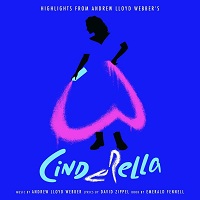 Studio Cast, 2021 (Polydor) 0 stars, not recommended. What’s there to write about Andrew Lloyd Webber’s Cinderella that hasn’t already been written and/or said? Though this “modern twist” on the fairy tale premiered in the West End to a forgivingly warm reception as one of the first shows to open after the lengthy shutdown for the COVID-19 pandemic, the musical has since been plagued by bad press and public ridicule that only intensified when it opened on Broadway under the new title Bad Cinderella, giving critics and the internet plenty of fodder for its drubbing. No stage cast recording of the score exists, only this concept album, which was recorded before the show began performances in London. It would be easy to say that the album is a flat-out disaster — and it would probably be more entertaining if it were. To be clear, there is a lot of bad material here; but on the whole, the recording is just dull, with every song sounding like a first draft. A few of the performers who would go on to appear in the West End production are on hand. As Cinderella’s Stepmother, Victoria Hamilton-Barritt goes for glorified camp and does an uncanny Joanna Lumley impression, though with diminishing returns as the album continues. And in the title role, Carrie Hope Fletcher gives as close to a fully formed performance as the material will allow. While Webber is still capable of writing a decent ear worm (“Only You, Lonely You” “I Know I Have a Heart”), every song lasts far too long, until the melodies become white noise. Plus, Webber is back in his ’80s style of musicalizing scenes that don’t need it (“So Long,” “Unfair”). The orchestrations are thin, and the lyrics, by the usually reliable David Zippel, sound like placeholders for something wittier to be written later. In an attempt to give the listener an idea of the musical’s new story line, a fair amount of dialogue is sprinkled throughout the album, but the plot is so confusing and messy that you may feel it’s easier to make sense out of a James Joyce novel. Due to the harshly negative reception of the Broadway production, a new recording of (Bad) Cinderella is unlikely, making this one a must-have for all flop collectors as a token of what will probably come to be known as the biggest failure of Andrew Lloyd Webber’s career. For anyone else, there are far better Cinderellas out there. Best to take one of them for a spin on the dance floor and leave this recording out in the pumpkin patch. — Matt Koplik
Studio Cast, 2021 (Polydor) 0 stars, not recommended. What’s there to write about Andrew Lloyd Webber’s Cinderella that hasn’t already been written and/or said? Though this “modern twist” on the fairy tale premiered in the West End to a forgivingly warm reception as one of the first shows to open after the lengthy shutdown for the COVID-19 pandemic, the musical has since been plagued by bad press and public ridicule that only intensified when it opened on Broadway under the new title Bad Cinderella, giving critics and the internet plenty of fodder for its drubbing. No stage cast recording of the score exists, only this concept album, which was recorded before the show began performances in London. It would be easy to say that the album is a flat-out disaster — and it would probably be more entertaining if it were. To be clear, there is a lot of bad material here; but on the whole, the recording is just dull, with every song sounding like a first draft. A few of the performers who would go on to appear in the West End production are on hand. As Cinderella’s Stepmother, Victoria Hamilton-Barritt goes for glorified camp and does an uncanny Joanna Lumley impression, though with diminishing returns as the album continues. And in the title role, Carrie Hope Fletcher gives as close to a fully formed performance as the material will allow. While Webber is still capable of writing a decent ear worm (“Only You, Lonely You” “I Know I Have a Heart”), every song lasts far too long, until the melodies become white noise. Plus, Webber is back in his ’80s style of musicalizing scenes that don’t need it (“So Long,” “Unfair”). The orchestrations are thin, and the lyrics, by the usually reliable David Zippel, sound like placeholders for something wittier to be written later. In an attempt to give the listener an idea of the musical’s new story line, a fair amount of dialogue is sprinkled throughout the album, but the plot is so confusing and messy that you may feel it’s easier to make sense out of a James Joyce novel. Due to the harshly negative reception of the Broadway production, a new recording of (Bad) Cinderella is unlikely, making this one a must-have for all flop collectors as a token of what will probably come to be known as the biggest failure of Andrew Lloyd Webber’s career. For anyone else, there are far better Cinderellas out there. Best to take one of them for a spin on the dance floor and leave this recording out in the pumpkin patch. — Matt Koplik
Charlie and the Chocolate Factory
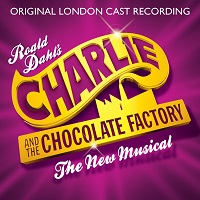 Original London Cast, 2013 (Watertower Music)
Original London Cast, 2013 (Watertower Music)  (1 / 5) The first stage iteration of Marc Shaiman and Scott Wittman’s musical adaptation of Roald Dahl’s children’s novel preserves only one of Leslie Bricusse and Anthony Newley’s songs from the film Willy Wonka and the Chocolate Factory — “Pure Imagination” — but the entire album seems to hold its breath until that track arrives very late in the proceedings. Nothing else in the new score sounds anything like it, and Shaiman and Wittman fail to crack the code on converting the episodic structure of Dahl’s book to musical theater form. Jack Costello’s Charlie is charming in the opening number, “Almost Nearly Perfect,” but the other four kids who win a tour of Willy Wonka’s factory are as madly annoying as they’re meant to be, resulting in a quartet of bad songs introducing each child in the first act and a quartet of worse songs getting rid of each child in the second. Shaiman writes music in different styles for the four families — a polka for the Gloops, an English patter song for the Salts, a poppy rap for the Beauregardes, and electronic cacophony for the Teavees — so the score never gets a chance to advance beyond Russian Roulette-style genre-jumping. Nor does the show comfortably translate Dahl’s self-aware rudeness for a contemporary audience. Augustus Gloop’s fat-shaming yodel is cringe-worthy, but the lyrics for “Vidiots,” the Oompa Loompas’ condemnation of kids who play video games, are the album’s nadir: “Alas, alas, poor Mike Teavee / For OMG, he’s ADD.” (Credit Iris Roberts for making a strong, frantic impression as Mike’s harried mother.) The songs for Wonka (Douglas Hodge) are insubstantial, too, until he finally arrives at “Pure Imagination” and listeners can breathe a sigh of relief. — Dan Rubins
(1 / 5) The first stage iteration of Marc Shaiman and Scott Wittman’s musical adaptation of Roald Dahl’s children’s novel preserves only one of Leslie Bricusse and Anthony Newley’s songs from the film Willy Wonka and the Chocolate Factory — “Pure Imagination” — but the entire album seems to hold its breath until that track arrives very late in the proceedings. Nothing else in the new score sounds anything like it, and Shaiman and Wittman fail to crack the code on converting the episodic structure of Dahl’s book to musical theater form. Jack Costello’s Charlie is charming in the opening number, “Almost Nearly Perfect,” but the other four kids who win a tour of Willy Wonka’s factory are as madly annoying as they’re meant to be, resulting in a quartet of bad songs introducing each child in the first act and a quartet of worse songs getting rid of each child in the second. Shaiman writes music in different styles for the four families — a polka for the Gloops, an English patter song for the Salts, a poppy rap for the Beauregardes, and electronic cacophony for the Teavees — so the score never gets a chance to advance beyond Russian Roulette-style genre-jumping. Nor does the show comfortably translate Dahl’s self-aware rudeness for a contemporary audience. Augustus Gloop’s fat-shaming yodel is cringe-worthy, but the lyrics for “Vidiots,” the Oompa Loompas’ condemnation of kids who play video games, are the album’s nadir: “Alas, alas, poor Mike Teavee / For OMG, he’s ADD.” (Credit Iris Roberts for making a strong, frantic impression as Mike’s harried mother.) The songs for Wonka (Douglas Hodge) are insubstantial, too, until he finally arrives at “Pure Imagination” and listeners can breathe a sigh of relief. — Dan Rubins
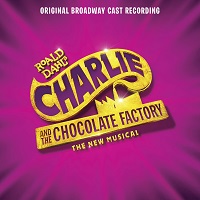 Original Broadway Cast, 2017 (Masterworks)
Original Broadway Cast, 2017 (Masterworks)  (2 / 5) This Broadway recording is a marked improvement over the London cast album, not least for the reintroduction of most of the songs from the 1971 film Willy Wonka and the Chocolate Factory: “Candy Man,” “I’ve Got A Golden Ticket,” and “Oompa Loompa” all join “Pure Imagination.” Christian Borle has greater range than Douglas Hodge as Willy Wonka, and his opening rendition of “The Candy Man” sets a clearer tone for the character. The album generously rotates through the three young actors who played Charlie on Broadway, with Jake Ryan Flynn making a particularly terrific impression in a new, joyous waltz, “Willy Wonka! Willy Wonka!” and also in “The View From Here,” a sweet ballad with rousing counterpoint. Most of the other kids’ songs, including the deadly “Vidiots,” remain in some form; but a major casting change, with adults playing all the children except Charlie, makes the show’s added cruelties towards these characters somewhat more tolerable. That said, a notorious scene from this production, in which squirrels tear Veruca Salt (now inexplicably Russian) to pieces, is commemorated on the album in “Veruca’s Nutcracker Sweet,” which contains tasteless couplets such as “Veruca Salt was once en pointe / But watch as we dislocate each joint.” On the plus side, Trista Dollison is especially good in “The Queen of Pop,” Violet’s intro song, which recalls Shaiman and Wittman’s far superior work for Hairspray. The new, discomfiting song “When Willy Meets Oompa” seems to double down on the Oompa Loompa plot line’s colonial undercurrents, but there’s enough inoffensive sweetness elsewhere — courtesy of the three Charlies, John Rubinstein’s Grandpa Joe, and Borle’s ballads — to make this a listenable album. — D.R.
(2 / 5) This Broadway recording is a marked improvement over the London cast album, not least for the reintroduction of most of the songs from the 1971 film Willy Wonka and the Chocolate Factory: “Candy Man,” “I’ve Got A Golden Ticket,” and “Oompa Loompa” all join “Pure Imagination.” Christian Borle has greater range than Douglas Hodge as Willy Wonka, and his opening rendition of “The Candy Man” sets a clearer tone for the character. The album generously rotates through the three young actors who played Charlie on Broadway, with Jake Ryan Flynn making a particularly terrific impression in a new, joyous waltz, “Willy Wonka! Willy Wonka!” and also in “The View From Here,” a sweet ballad with rousing counterpoint. Most of the other kids’ songs, including the deadly “Vidiots,” remain in some form; but a major casting change, with adults playing all the children except Charlie, makes the show’s added cruelties towards these characters somewhat more tolerable. That said, a notorious scene from this production, in which squirrels tear Veruca Salt (now inexplicably Russian) to pieces, is commemorated on the album in “Veruca’s Nutcracker Sweet,” which contains tasteless couplets such as “Veruca Salt was once en pointe / But watch as we dislocate each joint.” On the plus side, Trista Dollison is especially good in “The Queen of Pop,” Violet’s intro song, which recalls Shaiman and Wittman’s far superior work for Hairspray. The new, discomfiting song “When Willy Meets Oompa” seems to double down on the Oompa Loompa plot line’s colonial undercurrents, but there’s enough inoffensive sweetness elsewhere — courtesy of the three Charlies, John Rubinstein’s Grandpa Joe, and Borle’s ballads — to make this a listenable album. — D.R.
Between the Lines
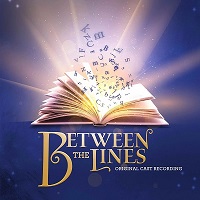 Original Off-Broadway Cast, 2022 (Ghostlight)
Original Off-Broadway Cast, 2022 (Ghostlight)  (3 / 5) Are you ever too old to fall in love with a fairytale? Or a fairytale prince? This question is the basis for Between the Lines, a musical by Elyssa Samsel and Kate Anderson that premiered Offf-Broadway in 2022. The show centers on troubled teen Delilah McPhee, who has to navigate life as a target of school bullies and the daughter of a divorced, broke, single mother. In order to survive her situation, Delilah has to find a way out, and she does that by falling in love with the prince from a fairytale book she has recently begun to read, the only copy of which happens to be in her school library. As the location of the show switches back and forth between reality and the fantasy world of the book, it’s easy for the cast album listener to get lost, all the more so because no interstitial dialogue is recorded here. For example, does Will Burton’s charming soft-shoe “Out of Character” come off as well if you don’t realize until the end of the song that he’s playing a dog? Or will you understand that, when Vicki Lewis performs “Can’t Get ‘Em Out,” she is playing the book’s author rather than a therapist or one of the few other characters she portrays in the show? As for the score itself, the main problem it that it suffers from a lack of originality. Since there are comparatively few teenage musicals, it’s impossible not to draw comparisons between this show’s high school outcast anthem “Allie McAndrews” and “I’d Rather Be Me” from Mean Girls, or between “Leaps and Bounds,” the nostalgic ballad heartbreakingly performed here by Julia Murney as Delilah’s mother, and, say, “Stop, Time” from Big. None of this is meant to suggest that Between the Lines is without its merits, the greatest ones being the catchiness of the tunes, whether melancholy or up-tempo, and the charming vocal performance by Jake David Smith as the handsome prince. Arielle Jacobs’ portrayal of Delilah is also compelling, and if some of the challenging score lies a bit outside of her vocal range, she has the acting chops to make up for it. Because of the many nice opportunities this show affords its cast in addition to the relatable story, it almost cries out for regional productions, and one can easily imagine that some of the score’s solo ballads will become audition room standards. So, ultimately, Between the Lines is worth your time, even if it’s a story you may feel you have read before. –– Charles Kirsch
(3 / 5) Are you ever too old to fall in love with a fairytale? Or a fairytale prince? This question is the basis for Between the Lines, a musical by Elyssa Samsel and Kate Anderson that premiered Offf-Broadway in 2022. The show centers on troubled teen Delilah McPhee, who has to navigate life as a target of school bullies and the daughter of a divorced, broke, single mother. In order to survive her situation, Delilah has to find a way out, and she does that by falling in love with the prince from a fairytale book she has recently begun to read, the only copy of which happens to be in her school library. As the location of the show switches back and forth between reality and the fantasy world of the book, it’s easy for the cast album listener to get lost, all the more so because no interstitial dialogue is recorded here. For example, does Will Burton’s charming soft-shoe “Out of Character” come off as well if you don’t realize until the end of the song that he’s playing a dog? Or will you understand that, when Vicki Lewis performs “Can’t Get ‘Em Out,” she is playing the book’s author rather than a therapist or one of the few other characters she portrays in the show? As for the score itself, the main problem it that it suffers from a lack of originality. Since there are comparatively few teenage musicals, it’s impossible not to draw comparisons between this show’s high school outcast anthem “Allie McAndrews” and “I’d Rather Be Me” from Mean Girls, or between “Leaps and Bounds,” the nostalgic ballad heartbreakingly performed here by Julia Murney as Delilah’s mother, and, say, “Stop, Time” from Big. None of this is meant to suggest that Between the Lines is without its merits, the greatest ones being the catchiness of the tunes, whether melancholy or up-tempo, and the charming vocal performance by Jake David Smith as the handsome prince. Arielle Jacobs’ portrayal of Delilah is also compelling, and if some of the challenging score lies a bit outside of her vocal range, she has the acting chops to make up for it. Because of the many nice opportunities this show affords its cast in addition to the relatable story, it almost cries out for regional productions, and one can easily imagine that some of the score’s solo ballads will become audition room standards. So, ultimately, Between the Lines is worth your time, even if it’s a story you may feel you have read before. –– Charles Kirsch
Busker Alley
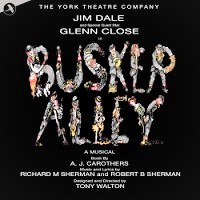 Studio Cast, 2007 (JAY)
Studio Cast, 2007 (JAY)  (1 / 5) Busker Alley never made it to Broadway, but it sure came close, first with a Tommy Tune-led national tour in 1995 (felled by Tune’s broken foot) and then with the York Theatre Company’s 2006 benefit concert starring Jim Dale (intended for a Broadway transfer that never happened). It’s the latter iteration that’s captured on this recording, including the one-night-only luxury casting of Glenn Close as the grown-up version of Libby, a pickpocket-turned-London busker-turned film star who abandons her lover and fellow street performer Charlie Baxter (Dale) in exchange for fame and fortune. Close introduces Charlie’s story in a spoken prologue and then returns at the end to sing, quite beautifully, “He Had A Way,” the gentle highlight of the album. Given the subject matter, many of the songs by the Sherman brothers (Mary Poppins, Over Here, etc.) are cloying street numbers, diegetic to the buskers’ world. The cast approaches these tunes with aggressive Cockney accents married to unnecessarily grating vocals meant to demonstrate, apparently, that these are resilient paupers down on their luck. Dale is fine, if ill-served by thin material, and he’s in his prime when farthest removed from the abiding, overzealous performance style, as in an angry reprise of the ballad “How Long Have I Loved Libby?” and in the short, sweet “Charlie the Busker.” As the younger Libby, Jessica Grové offers an endearing “He Has A Way,” but her Eliza Doolittle drawl is unsubtly distracting. Brevity here is not necessarily the soul of either wit or rich character development, and many of the songs are so brisk that it’s hard to glean much of a dramatic through-line. The street numbers also quickly become indistinguishable from one another (only the lively “Paddle Your Own Canoe” stands out), not helped by the repetitive arrangements for piano and drums. For the completist, it’s nice to have this score recorded, but this album doesn’t make a convincing case that the disappearance of Busker Alley was any great loss. — Dan Rubins
(1 / 5) Busker Alley never made it to Broadway, but it sure came close, first with a Tommy Tune-led national tour in 1995 (felled by Tune’s broken foot) and then with the York Theatre Company’s 2006 benefit concert starring Jim Dale (intended for a Broadway transfer that never happened). It’s the latter iteration that’s captured on this recording, including the one-night-only luxury casting of Glenn Close as the grown-up version of Libby, a pickpocket-turned-London busker-turned film star who abandons her lover and fellow street performer Charlie Baxter (Dale) in exchange for fame and fortune. Close introduces Charlie’s story in a spoken prologue and then returns at the end to sing, quite beautifully, “He Had A Way,” the gentle highlight of the album. Given the subject matter, many of the songs by the Sherman brothers (Mary Poppins, Over Here, etc.) are cloying street numbers, diegetic to the buskers’ world. The cast approaches these tunes with aggressive Cockney accents married to unnecessarily grating vocals meant to demonstrate, apparently, that these are resilient paupers down on their luck. Dale is fine, if ill-served by thin material, and he’s in his prime when farthest removed from the abiding, overzealous performance style, as in an angry reprise of the ballad “How Long Have I Loved Libby?” and in the short, sweet “Charlie the Busker.” As the younger Libby, Jessica Grové offers an endearing “He Has A Way,” but her Eliza Doolittle drawl is unsubtly distracting. Brevity here is not necessarily the soul of either wit or rich character development, and many of the songs are so brisk that it’s hard to glean much of a dramatic through-line. The street numbers also quickly become indistinguishable from one another (only the lively “Paddle Your Own Canoe” stands out), not helped by the repetitive arrangements for piano and drums. For the completist, it’s nice to have this score recorded, but this album doesn’t make a convincing case that the disappearance of Busker Alley was any great loss. — Dan Rubins
All in Love
 Original Off-Broadway Cast, 1961 (Mercury/Stage Door)
Original Off-Broadway Cast, 1961 (Mercury/Stage Door)  (2 / 5) With its lithe but insubstantial score, preserved nearly complete on the cast album, All In Love turned Richard Brinsley Sheridan’s classic farce The Rivals into a jaunty musical comedy. Featuring music by Jacques Urbont and lyrics by Bruce Geller, the show ran Off-Broadway briefly in 1961, though the album cover misleadingly declares that it was a “Broadway Hit Show.” The plot: Wealthy Captain Jack Absolute (David Atkinson) must disguise himself in pursuing Lydia Languish (Gaylea Byrne) because she desperately wants to marry a poor man. (“He can’t be all bad if he’s good and poor,” she sings in the opening number.) Urbont’s melodies are solidly good-natured but unmemorable throughout; the best of them include Atkinson’s ballad “I Love A Fool” (in which Jack praises Lydia’s “refined imbecility”) and the chipper “I Found Him,” sung by Christina Gillespie as the enamored servant Lucy. The composer ventures towards harmonic ambition only in “Why Wives?,” a vocally intricate but thematically dubious ensemble piece in which the men air their frustrations with monogamy. Geller’s lyrics could be wittier, but his love songs aren’t bad. For example, at one point Lucy exclaims: “I want everyone to know/That, just a miracle ago, I found him.” Lee Cass stands out among the singers, showing off his exquisite bass timbre in “The Lady Was Made To Be Loved.” The Rivals is now probably best known for introducing the character Mrs. Malaprop, Lydia’s twisty-tongued aunt; Mimi Randolph in that role delivers an appropriately silly number, “A More Than Ordinary Glorious Vocabulary,” in which she drops such jumbled wisdom as “Men are never contraceptive to a well-turned phrase.” All in Love is notable for the involvement of actor Dom DeLuise, who appeared in this show three years before his film debut, and orchestrator Jonathan Tunick. DeLuise’s only major moment on the album comes when he leads “Odds,” a goofy, disposable novelty number about cursing. But Tunick’s work glows throughout, emulating the best of his Golden Age forebears in using a large orchestral palette while en route to his game-changing collaborations with Burt Bacharach and Stephen Sondheim — Dan Rubins
(2 / 5) With its lithe but insubstantial score, preserved nearly complete on the cast album, All In Love turned Richard Brinsley Sheridan’s classic farce The Rivals into a jaunty musical comedy. Featuring music by Jacques Urbont and lyrics by Bruce Geller, the show ran Off-Broadway briefly in 1961, though the album cover misleadingly declares that it was a “Broadway Hit Show.” The plot: Wealthy Captain Jack Absolute (David Atkinson) must disguise himself in pursuing Lydia Languish (Gaylea Byrne) because she desperately wants to marry a poor man. (“He can’t be all bad if he’s good and poor,” she sings in the opening number.) Urbont’s melodies are solidly good-natured but unmemorable throughout; the best of them include Atkinson’s ballad “I Love A Fool” (in which Jack praises Lydia’s “refined imbecility”) and the chipper “I Found Him,” sung by Christina Gillespie as the enamored servant Lucy. The composer ventures towards harmonic ambition only in “Why Wives?,” a vocally intricate but thematically dubious ensemble piece in which the men air their frustrations with monogamy. Geller’s lyrics could be wittier, but his love songs aren’t bad. For example, at one point Lucy exclaims: “I want everyone to know/That, just a miracle ago, I found him.” Lee Cass stands out among the singers, showing off his exquisite bass timbre in “The Lady Was Made To Be Loved.” The Rivals is now probably best known for introducing the character Mrs. Malaprop, Lydia’s twisty-tongued aunt; Mimi Randolph in that role delivers an appropriately silly number, “A More Than Ordinary Glorious Vocabulary,” in which she drops such jumbled wisdom as “Men are never contraceptive to a well-turned phrase.” All in Love is notable for the involvement of actor Dom DeLuise, who appeared in this show three years before his film debut, and orchestrator Jonathan Tunick. DeLuise’s only major moment on the album comes when he leads “Odds,” a goofy, disposable novelty number about cursing. But Tunick’s work glows throughout, emulating the best of his Golden Age forebears in using a large orchestral palette while en route to his game-changing collaborations with Burt Bacharach and Stephen Sondheim — Dan Rubins
A Beautiful Noise
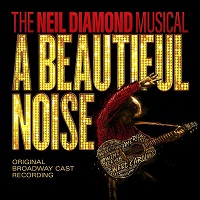 Original Broadway Cast, 2023 (UMe)
Original Broadway Cast, 2023 (UMe)  (3 / 5) This recording differs from the cast albums of many other jukebox musicals, including biomusicals such as Jersey Boys and Beautiful, in that the arrangements and orchestrations here are not close copies of those heard in these songs as originally written and recorded — in this case by Neil Diamond, the subject of this show. A Beautiful Noise exhibits more creativity in that regard, with fresh arrangements (by Sonny Paladino) and orchestrations (by Brian Usifer, Bob Gaudio, and Paladino) that recall the originals just closely enough to keep Diamond fans happy without sounding like carbon copies of the old charts. There’s also a delightful “Opening Montage” featuring snippets of a large handful of Diamond hits in piquant choral arrangements for the ensemble. Another plus for the album is the stellar work of Will Swenson, who somehow manages to very credibly channel Neil Diamond’s husky rock baritone in such hits as “Sweet Caroline,” “Cracklin’ Rosie,” “Love on The Rocks,” etc., etc., even though the natural timbre of Swenson’s singing voice as heard in other shows and on other recordings is considerably lighter and higher. A persuasive argument for experiencing this show through the cast album, rather than actually attending a performance on Broadway, is that the audio-only option means you don’t have to suffer through the sometimes ridiculous setups for these pop songs as they have been placed within the book that Anthony McCarten has written around them — none more egregious than the setup for “You Don’t Bring Me Flowers,” here presented as a bittersweet farewell sung by Neil and his second wife, Marcia Murphey (Robyn Hurder), even though the lyrics have nothing to do with the issues that actually broke up their marriage. Recorded with no dialogue introduction whatsoever, this song may be thoroughly enjoyed out of context, along with all the rest on the album. — Michael Portantiere
(3 / 5) This recording differs from the cast albums of many other jukebox musicals, including biomusicals such as Jersey Boys and Beautiful, in that the arrangements and orchestrations here are not close copies of those heard in these songs as originally written and recorded — in this case by Neil Diamond, the subject of this show. A Beautiful Noise exhibits more creativity in that regard, with fresh arrangements (by Sonny Paladino) and orchestrations (by Brian Usifer, Bob Gaudio, and Paladino) that recall the originals just closely enough to keep Diamond fans happy without sounding like carbon copies of the old charts. There’s also a delightful “Opening Montage” featuring snippets of a large handful of Diamond hits in piquant choral arrangements for the ensemble. Another plus for the album is the stellar work of Will Swenson, who somehow manages to very credibly channel Neil Diamond’s husky rock baritone in such hits as “Sweet Caroline,” “Cracklin’ Rosie,” “Love on The Rocks,” etc., etc., even though the natural timbre of Swenson’s singing voice as heard in other shows and on other recordings is considerably lighter and higher. A persuasive argument for experiencing this show through the cast album, rather than actually attending a performance on Broadway, is that the audio-only option means you don’t have to suffer through the sometimes ridiculous setups for these pop songs as they have been placed within the book that Anthony McCarten has written around them — none more egregious than the setup for “You Don’t Bring Me Flowers,” here presented as a bittersweet farewell sung by Neil and his second wife, Marcia Murphey (Robyn Hurder), even though the lyrics have nothing to do with the issues that actually broke up their marriage. Recorded with no dialogue introduction whatsoever, this song may be thoroughly enjoyed out of context, along with all the rest on the album. — Michael Portantiere
Anyone Can Whistle
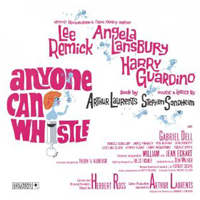 Original Broadway Cast, 1964 (Columbia/Sony)
Original Broadway Cast, 1964 (Columbia/Sony)  (5 / 5) The show was a flop, but virtually every number is a winner, and so is this recording. Broadway audiences were bored by Arthur Laurents’ bizarre, satirical fable in which corrupt, small-town politicians fake a miracle by pumping water out of a rock, thus creating a new Lourdes with its attendant tourist trade. But what a cast! Angela Lansbury launched her musical theater career as Cora Hoover Hooper, the scheming mayor. Her co-stars were Lee Remick as Fay Apple, head nurse in the local nuthouse (named The Cookie Jar!), and Harry Guardino as J. Bowden Hapgood, a phony psychiatrist who stirs up trouble. And what a score! Stephen Sondheim’s wildly inventive songs include a lengthy musical-dramatic sequence, “Simple,” and a campy ballet, “The Cookie Chase.” Lansbury’s opener, “Me and My Town,” is a riotous spoof of nightclub-diva dramatics. Remick gets the achingly beautiful title tune, and Guardino delivers the biting, driving “Everybody Says Don’t.” The final duet for Hapgood and Fay, “With So Little to Be Sure Of,” is one of Sondheim’s finest, most adult love songs. Don Walker’s orchestrations are brassy and delightful. Recorded the day after the show closed, the album has a raw quality — Lansbury, for one, evidences some vocal strain — that, paradoxically, makes it seem fresher than many recordings that are more polished. One of Remick’s numbers, “There Won’t Be Trumpets,” was cut before the show opened and left off the LP, but has been restored for the CD. This kind of “failure” is far more interesting than lots of long-running hits. Note: Look for the version of the cast album marked “Deluxe Expanded Edition.” It includes bonus tracks of Sondheim singing demo versions of, among other things, the cut number “The Lame, the Halt, and the Blind” and an alternate version of “With So Little to Be Sure Of.” — David Barbour
(5 / 5) The show was a flop, but virtually every number is a winner, and so is this recording. Broadway audiences were bored by Arthur Laurents’ bizarre, satirical fable in which corrupt, small-town politicians fake a miracle by pumping water out of a rock, thus creating a new Lourdes with its attendant tourist trade. But what a cast! Angela Lansbury launched her musical theater career as Cora Hoover Hooper, the scheming mayor. Her co-stars were Lee Remick as Fay Apple, head nurse in the local nuthouse (named The Cookie Jar!), and Harry Guardino as J. Bowden Hapgood, a phony psychiatrist who stirs up trouble. And what a score! Stephen Sondheim’s wildly inventive songs include a lengthy musical-dramatic sequence, “Simple,” and a campy ballet, “The Cookie Chase.” Lansbury’s opener, “Me and My Town,” is a riotous spoof of nightclub-diva dramatics. Remick gets the achingly beautiful title tune, and Guardino delivers the biting, driving “Everybody Says Don’t.” The final duet for Hapgood and Fay, “With So Little to Be Sure Of,” is one of Sondheim’s finest, most adult love songs. Don Walker’s orchestrations are brassy and delightful. Recorded the day after the show closed, the album has a raw quality — Lansbury, for one, evidences some vocal strain — that, paradoxically, makes it seem fresher than many recordings that are more polished. One of Remick’s numbers, “There Won’t Be Trumpets,” was cut before the show opened and left off the LP, but has been restored for the CD. This kind of “failure” is far more interesting than lots of long-running hits. Note: Look for the version of the cast album marked “Deluxe Expanded Edition.” It includes bonus tracks of Sondheim singing demo versions of, among other things, the cut number “The Lame, the Halt, and the Blind” and an alternate version of “With So Little to Be Sure Of.” — David Barbour
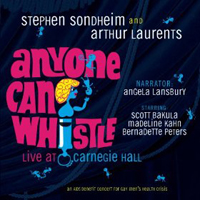 Carnegie Hall Concert Cast, 1995 (Columbia/Sony)
Carnegie Hall Concert Cast, 1995 (Columbia/Sony)  (1 / 5) This live recording of a starry concert version of Anyone Can Whistle, produced as a benefit for Gay Men’s Health Crisis, preserves more of the score than is heard on the original cast album. It includes “There Won’t Be Trumpets” as well as “There’s Always a Woman,” an unpleasant bitch-fest between Cora and Fay that was also cut from the score before the show opened on Broadway. But, 30 years on, nobody can muster much conviction for Laurents’ talky satire. As Cora, Fay, and Hapgood, Madeline Kahn, Bernadette Peters, and Scott Bakula respectively offer tentative, vocally wobbly performances, while Angela Lansbury narrates. Peters manages a lovely version of the title tune but lacks Remick’s vulnerability, and she’s really at a loss in the scenes where Fay impersonates a sexy French temptress. Kahn is the biggest disappointment here, giving a performance that lacks bite or energy. And Bakula doesn’t possess Guardino’s rough authority. What’s especially missed is the urgency of the original album. As sometimes happens in live recordings, the balance between singers and the orchestra is not ideal. Even Don Walker’s orchestrations, supervised by Jonathan Tunick, lose some edge. — D.B.
(1 / 5) This live recording of a starry concert version of Anyone Can Whistle, produced as a benefit for Gay Men’s Health Crisis, preserves more of the score than is heard on the original cast album. It includes “There Won’t Be Trumpets” as well as “There’s Always a Woman,” an unpleasant bitch-fest between Cora and Fay that was also cut from the score before the show opened on Broadway. But, 30 years on, nobody can muster much conviction for Laurents’ talky satire. As Cora, Fay, and Hapgood, Madeline Kahn, Bernadette Peters, and Scott Bakula respectively offer tentative, vocally wobbly performances, while Angela Lansbury narrates. Peters manages a lovely version of the title tune but lacks Remick’s vulnerability, and she’s really at a loss in the scenes where Fay impersonates a sexy French temptress. Kahn is the biggest disappointment here, giving a performance that lacks bite or energy. And Bakula doesn’t possess Guardino’s rough authority. What’s especially missed is the urgency of the original album. As sometimes happens in live recordings, the balance between singers and the orchestra is not ideal. Even Don Walker’s orchestrations, supervised by Jonathan Tunick, lose some edge. — D.B.
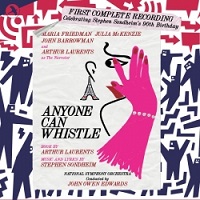 Studio Cast, 1997/2020 (JAY, 2CDs)
Studio Cast, 1997/2020 (JAY, 2CDs)  (2 / 5) Elephants, who take 23 months to gestate, have nothing on this two-disc set, which incubated for 23 years. Recording began, and the bulk of it was completed, in 1997 — several presidential administrations ago. This is one of those JAY efforts billed as complete recordings, including playoffs and curtain call and exit music. Chat room savants insist that certain numbers have been cut slightly, and “There’s Always a Woman” is M.I.A. Nevertheless, this is the fullest recorded edition of Anyone Can Whistle that we are likely to get. Happily preserved are “The Cookie Chase” (in a lengthier version than that contained on the OBCR) and the ballet attached to “Everybody Says Don’t,” one of the jazzier passages in any Sondheim-composed musical. But the overly reverent approach to this score, treating a scrappy, satirical musical like a tony Gesamtkunstwerk, is counterproductive. Of the three stars, Julia McKenzie comes off best, punching her way through “Me and My Town” and “A Parade in Town” with gusto, but, unlike Lansbury, she doesn’t seem to be having fun with Cora’s cartoon-villain qualities. John Barrowman is a disconcertingly boyish Hapgood, which may be why he oversells “Everybody Says Don’t,” shouting every fifth or sixth word of the lyrics to signal his passion. Also problematic is Maria Friedman as Fay — a joyless Joan of Arc, lacking in warmth and applying an unpleasant vibrato to several numbers. Everyone’s line readings are pretty dire; this is a real issue in “Simple,” which weaves together music and dialogue. Conductor John Owen Edwards gets an expansive sound out of the National Symphony Orchestra, not always an asset in a show designed to be a sprightly spoof. It’s a pity that nobody recorded the 2010 New York City Center Encores! production of Anyone Can Whistle, which boasted the nearly ideal cast of Raúl Esparza, Sutton Foster, and Donna Murphy. But if you’re a superfan of the show, you’ll want to hear this recording if only because it does have material not available anywhere else — with Arthur Laurents, sounding like he needs a nap, providing occasional narration — D.B.
(2 / 5) Elephants, who take 23 months to gestate, have nothing on this two-disc set, which incubated for 23 years. Recording began, and the bulk of it was completed, in 1997 — several presidential administrations ago. This is one of those JAY efforts billed as complete recordings, including playoffs and curtain call and exit music. Chat room savants insist that certain numbers have been cut slightly, and “There’s Always a Woman” is M.I.A. Nevertheless, this is the fullest recorded edition of Anyone Can Whistle that we are likely to get. Happily preserved are “The Cookie Chase” (in a lengthier version than that contained on the OBCR) and the ballet attached to “Everybody Says Don’t,” one of the jazzier passages in any Sondheim-composed musical. But the overly reverent approach to this score, treating a scrappy, satirical musical like a tony Gesamtkunstwerk, is counterproductive. Of the three stars, Julia McKenzie comes off best, punching her way through “Me and My Town” and “A Parade in Town” with gusto, but, unlike Lansbury, she doesn’t seem to be having fun with Cora’s cartoon-villain qualities. John Barrowman is a disconcertingly boyish Hapgood, which may be why he oversells “Everybody Says Don’t,” shouting every fifth or sixth word of the lyrics to signal his passion. Also problematic is Maria Friedman as Fay — a joyless Joan of Arc, lacking in warmth and applying an unpleasant vibrato to several numbers. Everyone’s line readings are pretty dire; this is a real issue in “Simple,” which weaves together music and dialogue. Conductor John Owen Edwards gets an expansive sound out of the National Symphony Orchestra, not always an asset in a show designed to be a sprightly spoof. It’s a pity that nobody recorded the 2010 New York City Center Encores! production of Anyone Can Whistle, which boasted the nearly ideal cast of Raúl Esparza, Sutton Foster, and Donna Murphy. But if you’re a superfan of the show, you’ll want to hear this recording if only because it does have material not available anywhere else — with Arthur Laurents, sounding like he needs a nap, providing occasional narration — D.B.
Carrie
 Premiere Cast Recording, 2012 (Ghostlight)
Premiere Cast Recording, 2012 (Ghostlight)  (2 / 5) Based on the supernatural horror novel by Stephen King, which had previously been adapted as a highly successful film in 1976, Carrie is/was one of the most infamous, ignominious flops in musical theater history. After a disastrous tryout run in Stratford-Upon Avon, the show managed only 16 previews and five performances on Broadway in the spring of 1988, yielding no cast album. Many critics and others felt that the work of composer Michael Gore, lyricist Dean Pitchford, and book writer Lawrence D. Cohen was wildly inconsistent in quality, with several riveting moments of confrontation between the bullied, telekinetic teenager Carrie White and her religious zealot mother Margaret playing out powerfully in the midst of risible scenes and songs concerning Carrie’s experiences in high school. Apparently, much of the problem with the production rested in the fact that the American creative team and director Terry Hands of the Royal Shakespeare Company were not on the same page as to what the look, tone, and presentation style of the show should be. But, as noted, there were also huge problems in the writing, leading to major changes for the revisal that was presented Off-Broadway in 2012. The songs “Dream On,” “It Hurts to Be Strong,” “Don’t Waste the Moon,” “Heaven,” “I’m Not Alone,” “Wotta Night,” and the camp classic “Out for Blood” were all dropped, while several new ones were added; two of the best of them are the ballad “Dreamer in Disguise,” sweetly sung by Derek Klena in the role of Tommy Ross, and “Stay Here Instead,” in which Margaret pathetically pleads with her daughter not to go to the prom. (If only she had listened!) But there are still a few mediocre or worse numbers among both the old and new songs, for example, “In” and “A Night We’ll Never Forget.” As was the case with the original version, the score’s musical/dramatic highlights are the unnerving Carrie/Margaret duets “And Eve Was Weak” and “I Remember How Those Boys Could Dance,” and Margaret’s moving solo “When There’s No One.” On the cast album of the 2012 production, these and other songs benefit greatly from the deeply committed performances of Molly Ranson as the tormented Carrie and one of the all-time Broadway greats, Marin Mazzie, as her sadly deranged mother. Rounding out the strong cast are Christy Altomare as Sue, Jeanna de Waal as Chris, Ben Thompson as Billy, Wayne Alan Wilcox as Mr. Stephens, and Carmen Cusack in a wonderfully warm turn as Miss Gardner. — Michael Portantiere
(2 / 5) Based on the supernatural horror novel by Stephen King, which had previously been adapted as a highly successful film in 1976, Carrie is/was one of the most infamous, ignominious flops in musical theater history. After a disastrous tryout run in Stratford-Upon Avon, the show managed only 16 previews and five performances on Broadway in the spring of 1988, yielding no cast album. Many critics and others felt that the work of composer Michael Gore, lyricist Dean Pitchford, and book writer Lawrence D. Cohen was wildly inconsistent in quality, with several riveting moments of confrontation between the bullied, telekinetic teenager Carrie White and her religious zealot mother Margaret playing out powerfully in the midst of risible scenes and songs concerning Carrie’s experiences in high school. Apparently, much of the problem with the production rested in the fact that the American creative team and director Terry Hands of the Royal Shakespeare Company were not on the same page as to what the look, tone, and presentation style of the show should be. But, as noted, there were also huge problems in the writing, leading to major changes for the revisal that was presented Off-Broadway in 2012. The songs “Dream On,” “It Hurts to Be Strong,” “Don’t Waste the Moon,” “Heaven,” “I’m Not Alone,” “Wotta Night,” and the camp classic “Out for Blood” were all dropped, while several new ones were added; two of the best of them are the ballad “Dreamer in Disguise,” sweetly sung by Derek Klena in the role of Tommy Ross, and “Stay Here Instead,” in which Margaret pathetically pleads with her daughter not to go to the prom. (If only she had listened!) But there are still a few mediocre or worse numbers among both the old and new songs, for example, “In” and “A Night We’ll Never Forget.” As was the case with the original version, the score’s musical/dramatic highlights are the unnerving Carrie/Margaret duets “And Eve Was Weak” and “I Remember How Those Boys Could Dance,” and Margaret’s moving solo “When There’s No One.” On the cast album of the 2012 production, these and other songs benefit greatly from the deeply committed performances of Molly Ranson as the tormented Carrie and one of the all-time Broadway greats, Marin Mazzie, as her sadly deranged mother. Rounding out the strong cast are Christy Altomare as Sue, Jeanna de Waal as Chris, Ben Thompson as Billy, Wayne Alan Wilcox as Mr. Stephens, and Carmen Cusack in a wonderfully warm turn as Miss Gardner. — Michael Portantiere

